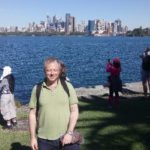Arvanitakis on education: The trust project

Since the 2016 election of Donald Trump, the rise of populism has been the focus of scholars and commentators alike. While Trump may have lost the 2020 election, populist leaders remain dominant across the world – something unlikely to change in the foreseeable future.
One trend that has paralleled this rise of populist leaders has been the loss of trust by significant sections of the population in scientific and expert systems including universities.
This is not to argue for a simple causality, but rather that experts and expert systems have been attacked as elitist, out of touch and failing many. In fact, the priorities between ‘the experts’ (and elites) and ‘the people’ has been framed through simple binaries including ‘jobs v. environment’ or ‘immigration v. jobs.’ Populist media who often describe universities as ‘ivory towers’ that are home to ‘boffins’, further exasperating divisions that increase levels of distrust.
As far back as March 2020, many were worrying that this distrust in experts would undermine America’s response to the pandemic. Since then, we have witnessed the pandemic become a partisan issue and those supporting the Trump Presidency have been driven along by conspiracy theories and a refusal to believe medical experts. The impacts have been devastating.
While in Australia our systematic response to the pandemic has resulted in increasing levels of trust in government and medical experts. This, however, should not create a false sense of security that we have arrested the increasing levels of distrust that has paralysed Australia’s energy policy and response to climate change.
The complexity of scepticism
For some, a rise of scepticism is about holding science and scientists to account. In the academic field of history and philosophy of science, for example, theorists such as Alan Irwin and Brian Wynne have long outlined the limitations of expert systems and encouraged lay-person oversight. Their arguments revolve around the need for citizen science and localised (lay) knowledge to be an important part of the scientific journey.
Others have long outlined the problematic nature of science in areas ranging from ‘race science’, eugenics and even vaccines. As Winston Morgan points out, scepticism amongst the Black population towards a Covid19 vaccine should not be simply dismissed as ‘anti-vaxxers.’
This scepticism links to a long history of medical abuse that include experiments on enslaved Black women in the US and the Tuskegee study that ran between 1932 and 1970, which was supposed to investigate syphilis treatment in Black men. Doctors involved left many men with the disease to study the consequences even when effective treatment became available.
For others, the removal of scientific experts from decision-making is part of building a more business friendly environment. Twelve months ago, the New York Times outlined the way scientific expertise had been undermined and removed from influencing policy development in the Whitehouse. This was part of the Administration’s desire to free American business from what they saw as problematic red-tape.
Then there are others who see no role for scientists in decision making. Jared Kushner, Donald Trump’s son-in-law and senior advisor, for example, boasted that the Trump Administration was ‘taking the country back’ from doctors.
What is to be done?
From climate change to dealing to the next global pandemic, the undermining of scientific institutions including universities must be confronted. The need for the scientific community to reclaim the ground lost is not only an environment and health imperative, but also an economic and democratic one.
The question is, what response is required to build trust? Below are five steps that we, as scholars and scientists, need to embrace.
The first step is to accept that we as scholars and researchers are at least partially to blame for the current situation. The ethical failings outlined above, the inability communicate, the dismissal of lay knowledge have all created a gap for the seeds of distrust to expand.
Secondly, we must learn to communicate. As Australia’s former Chief Scientist outlined, much of academic writing is indecipherable. Within academia, there seems to be an inability to understand there is a difference between simplification (or generalisation) and simplifying (that is, ensuring the language we adopt is accessible and what we are saying is as relevant to people’s everyday lives). We seem to take pride in making our explanations complex and incomprehensible.
Thirdly, we must stope creating false binaries that place people into simple categories. For example, supporters of local coal industries can still want action on climate change. In the USA, I learnt that the reasons that some people voted for Donald Trump had nothing to do with his vulgarity or anti-immigration stance. Many did so because they feel betrayed by the mainstream of both parties. We all make decisions based on a complex series of issues – and our political opponents are no different.
This takes me to the fourth point: that we should learn to speak to those we disagree with. Previously I have argued that there is a need for us to build brave spaces not just safe spaces on university campuses. Part of this is working with our students to ensure we can have uncomfortable conversations including disagreements. It is a lost art and one we need to re-embrace.
Finally, if we do intend to be involved in public conversations, then we need to accept that public engagements can be ‘messy.’ We will come across those who vehemently oppose our position and we need to both embrace this as part of public engagement as well as learn to respond, accepting that we will not win everyone over.
How can this all work?
We can all learn from UK-based Heidi Larson, who is the founder of the Vaccine Confidence Project. Larson sees her mission as dispelling vaccine hesitancy through the building of trust. To achieve this, she seeks to understand those who refuse vaccines and avoids labels such as ‘anti-vaxxers.’
A friend of mine once said to me that the problem with academics is that ‘you would rather be right than rich.’ What he meant is that we were too busy embracing the moral high ground to listen to the people whose lives that we were attempting to influence.
In this way, we seem satisfied that we are right even as our influence continues to diminish.
Professor James Arvanitakis is the Executive Director of the Australian American Fulbright Commission – one of the world’s most prestigious international education and cultural exchange programs.














